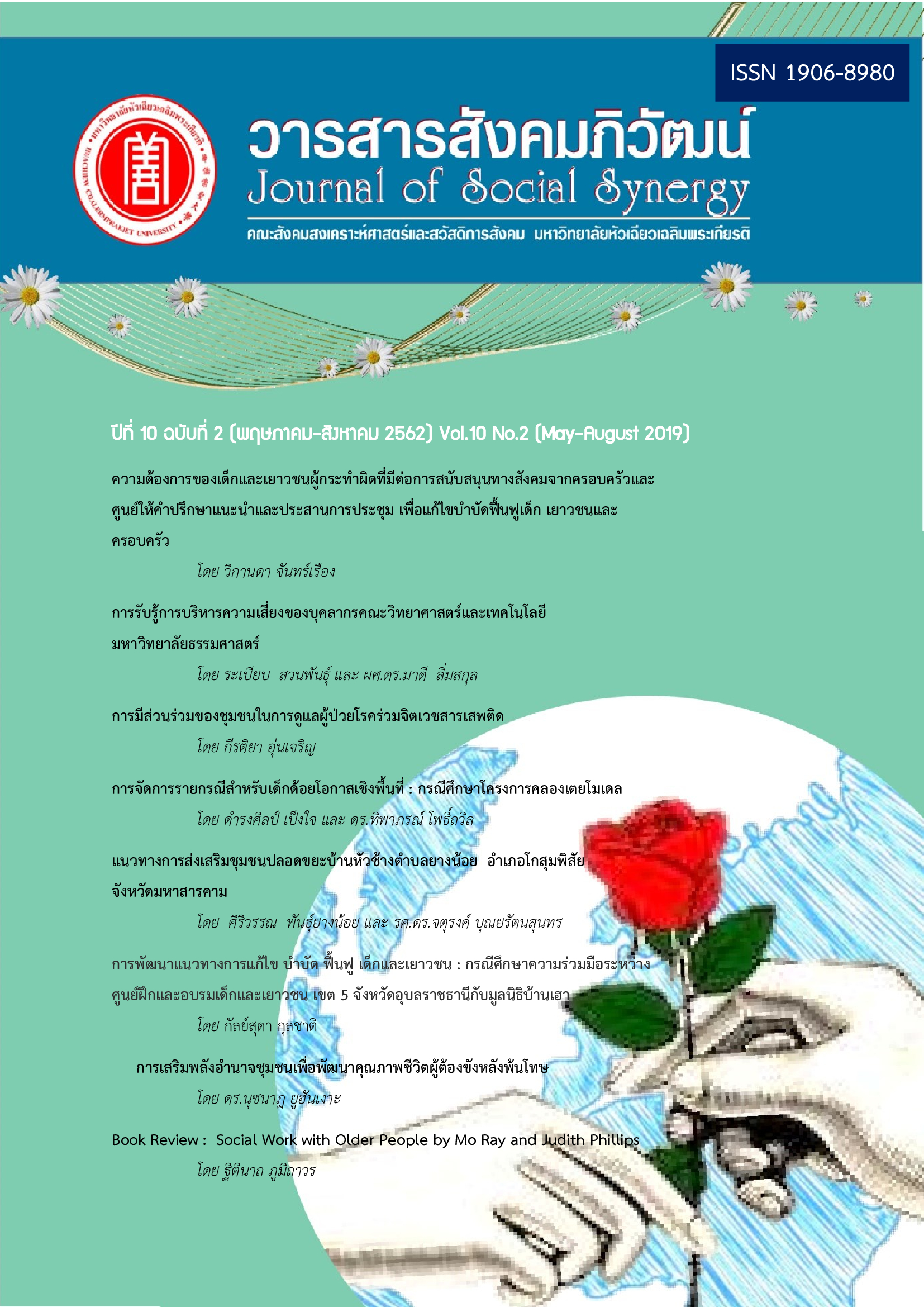Needs of Child and Juvenile Offenders on Social Supports by Families and the Counseling Center
Keywords:
Children and Youth, Social Support, Counseling CenterAbstract
The Study on “Needs of Child and Juvenile Offenders on Social Supports by Families and the Counseling Center” aims to study family relationships and social supports by families and the Counseling Center. The quantitative and qualitative researches were applied in this study. The data was collected by questionnaire (106 child and juvenile offenders of criminal cases), focus group (10 groups) and interview (3 families). The data from questionnaire was proceeded by SPSS; the data from focus group and family interview was analyzed. The data was presented by statistic tables and data explanation, educational analysis.
The study results revealed that most samples were male, aged 16-18 years, had lower secondary education (Grade 9), had family income of 10,000 Baht or lower and were convicted of drug offenses. They lived with their parents and their parents cohabited. The family relationship of the samples was at the moderate level. Families took care of food and illness and/ or problems. They did not talk much and rarely complimented, but often blamed. The needs on family support in all aspects were at the moderate level. They needed their families to talk to each other, listen to problems and express love. They did not need stuff or money. They needed to consult friends rather than families and to make decisions by themselves. The needs on the Center’s support in all aspects were at the moderate level. The pre and post judgement groups had different needs on consulting issues and methods. Both groups had the same needs i.e. no psychology check, referral, participation in court’s activities.
The recommendations from the study are that the Counseling Center should develop consulting manuals, keep guidelines on child and juvenile analysis and set policies on working with community network. Trainings should be provided to consultants in terms of consulting knowledge and skills, family relationship support, empowerment and network management. This is to rehabilitate child and juvenile offenders appropriately.
References
คงเดช ลีโทชวลิต, ปิยะ พวงสำลี และคณะ. (2553). กระบวนการพัฒนาเด็กและเยาวชนเพื่อเสริมสร้างความเข้มแข็งยกระดับความสัมพันธ์ภายในครอบครัวและชุมชน จังหวัดนครปฐม (รายงานการวิจัย). นครปฐม: สำนักงานสาธารณสุขจังหวัดนครปฐม และ สำนักงานสหภาคีความร่วมมือ.
จิราพร ชมพิกุล. (2552). สัมพันธภาพในครอบครัวไทย = Relationship in Thai Families (รายงานการวิจัย). นครปฐม: สถาบันพัฒนาการสาธารณสุขอาเซียน มหาวิทยาลัยมหิดล.
ดวงแก้ว ป้านภูมิ. (2557). ความต้องการของเด็กและเยาวชนที่กระทำผิดหลังปล่อยตัวกลับคืนสู่ครอบครัว
(สารนิพนธ์ปริญญามหาบัณฑิต). กรุงเทพฯ: มหาวิทยาลัยธรรมศาสตร์.
นันทา สู้รักษา. (2546). โครงการการศึกษาปัจจัยด้านครอบครัวและกลุ่มเพื่อนที่เกี่ยวข้องกับ พฤติกรรมการเสพยาบ้าของวัยรุ่น: แนวทางป้องกันแก้ไข (รายงานการวิจัย). กรุงเทพฯ: มหาวิทยาลัยศรีนครินทรวิโรฒ.
วาสนา ทับทิมดี. (2549). ปัจจัยทางครอบครัวที่มีความสัมพันธ์กับการกระทำผิดของเด็กและเยาวชน กรณีศึกษาเด็กและเยาวชนในศูนย์ฝึกอบรมเด็กและเยาวชนเขต 6 จังหวัดนครสวรรค์ (ภาคนิพนธ์ปริญญามหาบัณฑิต). นนทบุรี : มหาวิทยาลัยสุโขทัยธรรมาธิราช, วิทยาลัยพัฒนาครอบครัวและสังคม, คณะคหกรรมศาสตร์, สาขามนุษยนิเวชศาสตร์.
สุณีย์ กัลยะจิตร. (2551). กระบวนการเข้าสู่การกระทำความผิดในคดีชีวิตและร่างกายของเด็กและเยาวชนชาย (รายงานการวิจัย). กรุงเทพฯ: มหาวิทยาลัยมหิดล
สำนักกฎหมาย สำนักงานเลขาธิการวุฒิสภา. (2554). พระราชบัญญัติศาลเยาวชนและครอบครัว และวิธีพิจารณาคดีเยาวชนและครอบครัว พ.ศ. 2553. กรุงเทพฯ : สำนักการพิมพ์ สำนักงานเขาธิการวุฒิสภา.
Downloads
Published
How to Cite
Issue
Section
License
บทความที่ได้รับการตีพิมพ์เป็นลิขสิทธิ์ของวารสารสังคมภิวัฒน์ มหาวิทยาลัยหัวเฉียวเฉลิมพระเกียรติ
ข้อความที่ปรากฏในบทความแต่ละเรื่องในวารสารวิชาการเล่มนี้เป็นความคิดเห็นส่วนตัวของผู้เขียนแต่ละท่านไม่เกี่ยวข้องกับมหาวิทยาลัยหัวเฉียวเฉลิมพระเกียรติ และคณาจารย์ท่านอื่นๆในมหาวิทยาลัยฯ แต่อย่างใด ความรับผิดชอบองค์ประกอบทั้งหมดของบทความแต่ละเรื่องเป็นของผู้เขียนแต่ละท่าน หากมีความผิดพลาดใดๆ ผู้เขียนแต่ละท่านจะรับผิดชอบบทความของตนเองแต่ผู้เดียว




